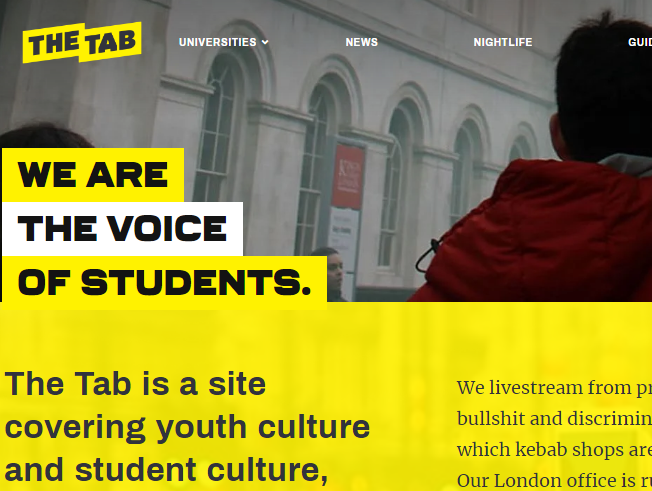
Student news site The Tab paid off its entire purchase cost between October 2020 and April 2022, according to parent company Digitalbox.
In the first half of 2022 the company, which has built its strategy around advertising to highly-engaged mobile audiences, experienced year-on-year revenue growth of 40%.
Another Digitalbox property, Entertainment Daily, accounted for the bulk of the company’s revenue.
But a third brand, satire site The Daily Mash, suffered a drop in revenue despite more than doubling its paying subscribers.
Having bought The Tab for £750,000 in the final quarter of 2020, Digitalbox got the site into profit within a month and paid off 70% of its purchase price in the first year.
The Tab’s success continued in the six months to 30 June 2022, with year-on-year revenue rising 52% to £513,000. The brand was more than twice as profitable for Digitalbox in H1 2022 than in H1 2021, with profits rising from £117,000 to £241,000.
Company chief executive James Carter told Press Gazette on Tuesday that despite economic headwinds hitting other publishers, the business was still hiring: “The team are continuing to evolve and recruit, and we are funnelling resources into the local content areas,” in particular the university campuses on which The Tab operates.
Carter also said The Tab had experienced a 57% growth in “monetisation”, which Digitalbox measures in advertising cash generated per 1000 visits.
Entertainment Daily had what the company called an “exceptionally strong” first half of the year, with revenue up 40% year-on-year to £1.3m. Profits from the entertainment news site rose from £591,000 to £915,000, a 55% year-on-year rise.
Carter explained that the business is “highly mobile-focused”.
“That’s where the eyeballs have gone over recent times. I think 85% of UK adults use a mobile device to access the internet, and spend four times the amount of time accessing the internet on a mobile device compared to a desktop device.
“So if there is a place that’s growing, where consumption is growing, it’s mobile. If there is a place which is playing catch-up on ad revenues, it’s mobile – because typically digital revenues have been planned and delivered around desktop devices.”
Across Digitalbox there was a 40% year-on-year revenue increase. Adjusted profits before amortisation, depreciation and exceptional charges stood at £700,000 – but once those costs are factored in, the company suffered an operating loss of £216,000 in the half.
The loss was driven largely by a greater than £700,000 write down on the value of The Daily Mash.
Carter told Press Gazette: “We decided to take a write down on the value of The Daily Mash for accounting rather than an operational reality. And the reason we did that is because we were changing the operational model, quite simply, from a pure advertising [and] open-access site to a hybrid [site] which is going to be driven by subscriptions.”
To that end, the Mash more than doubled the 450 paying subscribers it had signed up at the end of 2021, having garnered more than 1,000 by the end of June 2022.
Carter was bullish about the company’s ability to withstand the chaotic economic backdrop.
“I think we’re in a fantastic position, in the sense that if the market gets at all choppy, we’re really well placed to deal with it, in the sense we’ve got a lean operating model. We’ve been profitable every year that we’ve existed. And we’ve got £3.2m of cash in the bank, and it’s a good moment to try and take advantage and seize the opportunities that exist.”
He indicated those opportunities included acquisitions.
“In terms of [the] acquisition pipeline we’re continuing to look at further assets that we can acquire. And it seems like there’s more parties that are interested in exiting their businesses at this moment in time than there were 12 months ago. There’s more conversations taking place – but I can’t tell you with who, but there’s many more of those.”
Carter said that state of affairs may have arisen from broader economic fluctuations – but noted those fluctuations had not hurt Digitalbox.
“It’s fair to say – the economy, from what I read in Reach‘s results about the first half, they saw quite a drop in their advertising in Q2. We didn’t see anywhere near that drop…
“One of the other takeouts was really around the weak pound – perhaps bringing us a little bit of cheer, really, because a big chunk of our advertising is traded in dollars, so it means we collect that at a beneficial rate. Not that we’re particularly behind wanting the pound to collapse.”
He also noted that in its results for the same period, Ladbible Group had done less well in relative terms.
“Their first half-year, I think, was 8% up in revenue, 14% up in audience. So the comparison really for us – it makes us look quite good. I would say that, but it does.” He acknowledged that the rival publisher was investing heavily in targeting the US, however.
Was there any advice he would give to other media leaders to be in a good position entering a possible recessionary period?
“No special magic, other than being lean, keen and able to be very granular about what we’re doing.”
Email pged@pressgazette.co.uk to point out mistakes, provide story tips or send in a letter for publication on our "Letters Page" blog
